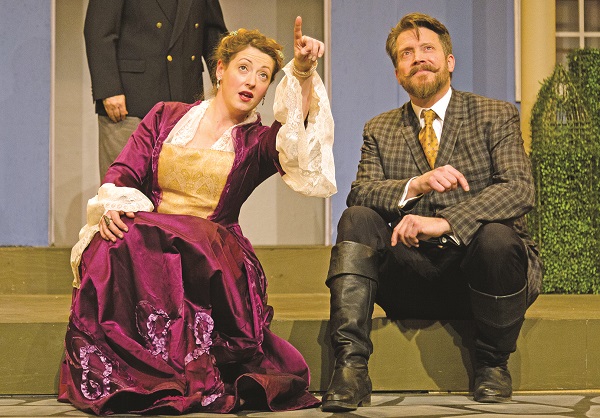General News » News
400 years on, Shakespeare’s themes still resonate in Much Ado About Nothing
January 18, 2017 · 0 Comments

By Brock Weir
What do you picture when you hear a story about individuals returning from war either to have to reconnect to a life they left behind or being left to rebuild their life from scratch?
Do you see soldiers returning Canada’s recent mission in Afghanistan? Do you picture your father or grandfather returning from one of the World Wars grappling with experiences never quite expressed?
They are universal themes – and they were universal themes when William Shakespeare tackled them – albeit in a comedy – over 400 years ago in Much Ado About Nothing, a classic which opens at Theatre Aurora this Thursday, January 19.
To underscore this universality, director Shawn Rocheleau has put a unique spin on Much Ado, setting in the interwar Canada of the 1920s.
“We’re sort of in the middle of a lot of anniversaries in the time period we’re in; we’re talking about the 100th anniversary of the First World War, last year was the 400th anniversary of Shakespeare’s death, and when you read Much Ado, it is very much a post-war play,” says Rocheleau, a teacher formerly of Dr. G.W. Williams Secondary School, who now teaches at Middlefield in Markham. “They are people who have returned from war and they are trying to make a life for themselves.
“I was teaching a lot of First World War stuff when I was preparing this and it seemed like a really natural fit and I think it speaks to the cultural heritage of Aurora and York Region. We have a really proud history of service and I wanted to honour that as much as I could. I don’t want to impose values and I don’t want to impose ideas and other than a few minor tweaks of the texts, it’s Shakespeare’s words. I wanted to overlay the period so it might be a little more relatable to people who are coming to see Shakespeare and don’t know what to expect.”
People often debate the relatability of Shakespeare’s works, but it is important to “dispel the myth” that “Shakespeare is hard.” When done right, it can be very accessible, he contends
In fact, Mr. Rocheleau says he was first bitten by the Shakespeare bug in Grade 7. From the outset, he fell in love with the language and felt it was something that really spoke to him. He encountered Shakespeare throughout his education, falling in love over and over again and when he became a teacher, he embraced the Bard.
“It is an uphill battle that has been difficult, that it is not accessible, and it has become my personal mission to try and show people that Shakespeare is relevant, accessible, fun and all those good things,” he says.
As a teacher, a lot of it is about demystifying the language and allowing the reader to find their own message in the work.
As a director, his primary aim is for the audience to enjoy it.
“There are people who will come to see this play and they will like Shakespeare already, and I want to make sure the production is something valuable for them, that we have done a good, solid production and that they enjoyed it and had fun,” he says. “I want people who come to Theatre Aurora with a friend, or because they wanted to try something new, to leave realising this is something they could possibly get into. I want to make sure people first and foremost are enjoying themselves and enjoying the play. I don’t think doing Shakespeare is an academic exercise; I think Shakespeare is art and we need to give them as good a performance as we can if we are doing something contemporary.”
Centred on common themes of mistaken identity, love, and even a dash of politics, in some respects Much Ado About Nothing is very much contemporary, but in other instances it is very much a product of its time. Hero, one of the female characters, for instance often gets a rough treatment because of her gender, the norm for Elizabethan times. This, says the director, might be counterintuitive for the age of Elizabeth I, arguably one of our most successful and influential monarchs, but that was the reality of the age; women did not have agency.
“In Canada in the 1920s, women had had the opportunity to suddenly have these more prominent roles and take on the leadership of traditionally male roles, so you have these people who are trying to struggle with the men who have come home, where do I fit into this?” he says. “I certainly don’t want to impose a value judgement because it is very easy for us 400 years on from Shakespeare and 100 years on from the First World War to make value judgements. I would rather present them as, ‘Okay, these are some issues this play has and this is how we’re interpreting it, and what do you think?’ If people are leaving with conversations after also having fun, that is a bonus.
“The reason we do these things now 400 years on is they still resonate.”
Much Ado About Nothing runs at Theatre Aurora on select dates and times through January 28. For a full schedule and ticket information, visit www.theatreaurora.com or call 905-727-3669.











